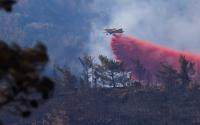20 April 2005Newsday.comNoel Holston
Signs and wonders? You want to see signs and wonders? Forget about tonight's second chapter of "Revelations," NBC's pop-apocalypse miniseries - that is, if you aren't already ignoring it. Instead, check out the premiere of "Strange Days on Planet Earth," a two-part National Geographic special that is flush with wonders and teeming with signs that suggest not some inevitable "end" but unpredictable, trying times ahead."It's like science fiction," host-narrator Edward Norton says at the outset. "Unsettling transformations are sweeping across the planet, and clue by clue investigators are assembling a new picture of Earth. They suggest we are entering a period of faster global change than any human being has ever witnessed."
Norton, an actor ("Fight Club," "Red Dragon"), may seem like a strange choice but comes by his credentials naturally. His father is the former head of policy for the Wilderness Society and is currently director of the Nature Conservancy's China program. Norton says he "grew up very steeped" in environmentalism. He never sounds as though he's just reading a script."Strange Days" is designed to be as accessible as possible. Each of the four one-hour installments is constructed rather like a mystery story: first an example of something going haywire in nature, then a search for clues, then the best explanation scientists can provide. It's the application of this process that, for instance, in tonight's second hour, links rising temperatures in the Indian Ocean to changes in weather systems over the North Atlantic, dumping fungus-infected dust from Africa on Trinidad and causing a rise in asthma among children. It is a small world, after all. Intricately interconnected, too.The series producers aren't above gimmicks. In the opening hour, which deals with the havoc accidentally transplanted organisms can wreak on new environments, Sheldon Mirowitz's soundtrack music lends an "X-Files" feel to vignettes about "alien hunters" - scientists who search coastal docks for evidence of intruding plants and sea animals from afar, or who probe old New Orleans mansions for Formosan subterranean termites that are eating the Big Easy like a Big Mac.They use such trickery sparingly, however, just to create entry points. They are trying to engage an audience that, if the included person-on-the-street interviews are an indication, is split mostly between those who couldn't care less and those who could but feel helpless.The overall lesson of tonight's two installments and of next week's - which deal with the disappearance of large predators and the increase of toxins in seas and lakes, respectively - is that little changes in nature don't just add up, they increase exponentially. And virtually all the changes cited can be traced back to the "planetary thermostat" we've turned up by burning fossil fuels at an accelerating clip over the past century.If these are strange days for planet Earth, they're glory days for PBS, which, not coincidentally, is the television network least concerned with promoting consumption and waste. From last Saturday's "State of the Planet" report to the "Deep Jungle" miniseries that premiered Sunday to the edition of "Scientific American Frontiers" about global warming that precedes the debut of "Strange Days" tonight, PBS is building up to Earth Day (Friday) with shows that celebrate natural wonders and biodiversity and that ask us what we're willing to do, what we're willing to change, to nurture and sustain this miraculous sphere we cohabit.Label these programs alarmist if you must, but they're not gloom and doom. They're about problems we can do something about if we can be bothered to acquire the knowledge and summon the will.STRANGE DAYS ON PLANET EARTH. National Geographic offers a two-part, four-hour study of curious developments on the old home sphere, what they mean and what we might do about them. Premieres tonight at 9 on WNET/13. Concludes next Tuesday night.






